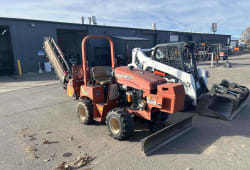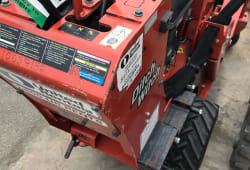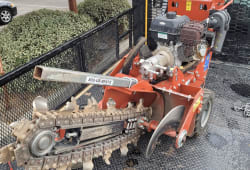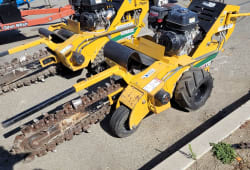Trenchers: Exploring the Depths of Heavy Equipment
9 Lectura mínima
)
diciembre 23, 2023
Trenchers are a vital category of heavy equipment designed for excavating trenches in the earth's surface. These machines play a crucial role in various industries, including construction, agriculture, and utilities. In this comprehensive exploration, we will delve into the intricacies of trenchers, examining their types, functionalities, applications, and technological advancements. Trenchers serve as indispensable tools for creating channels in the ground, facilitating the installation of pipelines, cables, and other essential infrastructure. As we navigate through the details of these powerful machines, we will uncover the significance they hold in shaping and advancing diverse sectors of our modern world.
The Genesis of Trenchers
Historical Evolution
Trenching, a pivotal facet of construction for centuries, initially relied on manual methods. The shift from manual labor to mechanized trenching marked a transformative milestone, enhancing both efficiency and excavation scale. This historical evolution underscores the dynamic progression of construction practices, highlighting the continuous quest for innovation and improved methodologies in the field.
Early Trenching Machines
The early trenching machines were basic and limited in their capabilities. These machines paved the way for the development of more advanced and specialized trenchers. In their infancy, these rudimentary devices struggled with efficiency and precision, prompting innovations that led to the creation of more sophisticated models. The evolution of early trenching machines marked a crucial phase in the construction industry, laying the groundwork for enhanced excavation techniques and improved infrastructure development.
Types of Trenchers
Chain Trenchers
Chain trenchers, also known as bucket wheel trenchers, are equipped with a digging chain that features cutting teeth. This type of trencher is commonly used for large-scale excavation projects. Chain trenchers efficiently cut through soil and rock, making them ideal for creating trenches in various terrains. Their robust design and ability to handle challenging conditions make chain trenchers valuable equipment in construction and civil engineering applications.
Wheel Trenchers
Wheel trenchers employ a digging wheel with buckets or teeth to remove soil and debris. They are versatile and suitable for various soil conditions, making them popular in construction and utility installations. Wheel trenchers efficiently cut through the ground, providing a reliable solution for excavation projects. Their robust design and adaptability make them a valuable choice for professionals tackling diverse digging requirements.
Micro Trenchers
Micro trenchers, specialized equipment tailored for smaller-scale projects and urban environments, revolutionize utility installations. With a compact design, they excel in navigating tight spaces like city streets, making them indispensable for efficient infrastructure development. The precision and agility of micro trenchers ensure seamless utility deployment in areas where conventional machinery faces limitations.
Rock Trenchers
Rock trenchers are specialized excavation machines designed to navigate and conquer challenging terrains featuring rocky soil. These powerful tools boast robust cutting elements that enable efficient digging in environments filled with rocks. Whether it's construction, mining, or infrastructure projects, rock trenchers prove indispensable in overcoming the difficulties posed by rugged landscapes, ensuring precision and effectiveness in excavation tasks.
Chain Trenchers with Conveyor Systems
Advanced trenching equipment, including Chain Trenchers with Conveyor Systems, revolutionizes excavation processes. These innovative trenchers seamlessly integrate conveyor systems, efficiently transporting excavated material, optimizing productivity, and minimizing the requirement for additional equipment to manage spoils. This streamlined design not only enhances operational efficiency but also ensures a more cost-effective and environmentally friendly approach to trenching tasks.
Components and Mechanisms
Digging Chain
The digging chain is a vital element of chain trenchers. It comprises interconnected digging teeth that penetrate the soil, efficiently removing material during trenching. The precision and strength of the digging chain play a crucial role in the overall performance of these machines, ensuring effective excavation in various soil conditions.
Trencher Boom
The trencher boom, a pivotal component, supports the digging chain and guides its movement with precision. This critical structural element plays a central role in determining the trench's depth and width, ensuring efficient and accurate excavation processes in various industries, from construction to utility installations.
Power Source
Trenchers, essential in excavation, derive power from diverse sources such as diesel engines, hydraulic systems, and, occasionally, electric motors. The chosen power source significantly impacts the machine's overall performance, dictating its efficiency and functionality in different applications, showcasing the versatility and adaptability of these crucial excavation tools.
Operator Controls
Modern trenchers, equipped with cutting-edge technology, boast intuitive operator controls that facilitate precise adjustments to trenching depth, speed, and other parameters. Operator Controls enhance efficiency, providing operators with unprecedented control over the machine, ensuring optimal performance in various excavation tasks.
Applications of Trenchers
Construction Industry
Trenchers play a pivotal role in the construction industry, where they are widely employed to excavate trenches for foundations, utilities, and drainage systems. Their efficiency and speed not only enhance excavation precision but also play a crucial role in meeting tight project timelines, streamlining construction processes with unparalleled effectiveness.
Agriculture
In agriculture, trenchers are employed for various purposes, including installing irrigation systems, drainage channels, and planting rows. They play a crucial role in optimizing agricultural land for efficient water management. These versatile machines help farmers enhance productivity by creating precise and well-defined trenches, facilitating essential tasks in crop cultivation.
Utilities and Infrastructure
Trenchers are indispensable in the installation of underground utilities such as water pipes, gas lines, and electrical conduits. Their precision and speed make them essential for urban infrastructure development. Efficient excavation with trenchers ensures reliable utility placement, contributing to the robust foundation of cities and their essential services.
Landscaping
Landscaping involves the artful arrangement of outdoor spaces, blending natural elements and human design. Landscapers use trenchers to craft precise edges, incorporate edging materials, and conceal cables for outdoor lighting systems. The adaptability of trenchers proves indispensable in reshaping and enhancing outdoor environments, ensuring a harmonious and aesthetically pleasing landscape.
Advancements in Trencher Technology
GPS Integration
Modern trenchers often incorporate GPS technology to enhance precision and accuracy in trenching operations. GPS integration allows for precise mapping of the trench layout and depth, reducing errors and optimizing efficiency.
Telematics and Remote Monitoring
Telematics systems enable remote monitoring of trencher performance, allowing operators and fleet managers to track machine health, fuel consumption, and maintenance needs. This technology enhances overall fleet management and reduces downtime.
Tier 4 Emission Standards
Many trenchers now adhere to stringent Tier 4 emission standards, incorporating advanced engine technologies to minimize environmental impact. These standards focus on reducing pollutants and improving fuel efficiency.
Ergonomic Design
Manufacturers prioritize ergonomic design in modern trenchers, aiming to enhance operator comfort and reduce fatigue during prolonged use. Comfortable seating, intuitive controls, and sound insulation contribute to a more operator-friendly experience.
Maintenance and Safety Considerations
Regular Inspection
Routine inspections, including regular inspection of the digging chain, hydraulic systems, and other components, are crucial for identifying and addressing potential issues before they escalate. This proactive approach ensures optimal performance and longevity, allowing for timely maintenance and preventing costly downtime or unexpected failures in heavy machinery.
Operator Training
Proper operator training is essential to ensure safe and efficient trencher operation. Training programs cover machine controls, safety protocols, and preventive maintenance practices. Operator training plays a crucial role in minimizing risks and maximizing productivity, fostering a culture of competence and responsibility within the workforce.
Safety Features
Trenchers, essential for excavation, boast advanced functionalities for efficient soil cutting. Safety features, such as emergency stop mechanisms, visibility enhancements, and warning systems, prioritize operator safety, ensuring a secure work environment. These precautions significantly minimize the risk of accidents, making trenching operations both productive and secure.
Lubrication and Fluid Checks
Routine maintenance is crucial for optimal trencher performance. Regular lubrication of moving parts and checks on hydraulic fluid levels are vital for maintaining efficiency. These tasks prevent excessive wear, ensuring smooth operation. Lubrication and fluid checks should be prioritized to extend the lifespan of the equipment and avoid potential issues.
Environmental Impact
Soil Displacement and Compaction
Trenchers, especially chain trenchers, can cause soil displacement and compaction during excavation. It is crucial to implement soil management practices to mitigate these impacts and restore soil health.
Spoil Disposal
Proper disposal of excavated material, known as spoil, is a critical consideration in trenching projects. Responsible spoil management involves recycling or reusing material whenever possible to minimize environmental impact.
Noise Pollution
Trenchers can generate significant noise levels during operation. Manufacturers focus on noise reduction technologies to minimize the environmental impact and adhere to regulatory standards.
Future Trends in Trencher Development
Automation and Robotics
The integration of automation and robotics in trencher design is a growing trend. Autonomous trenching machines equipped with AI and machine learning capabilities have the potential to revolutionize the industry.
Sustainable Design
As environmental awareness increases, trencher manufacturers are exploring sustainable design practices, such as using eco-friendly materials, energy-efficient systems, and alternative fuels.
Integration with Digital Platforms
Trenchers are likely to become more integrated with digital platforms, allowing for real-time data sharing, project management, and optimization of trenching processes.
Conclusion
Trenchers, as indispensable heavy equipment, have evolved significantly over time, from basic manual tools to sophisticated machines incorporating cutting-edge technology. Their widespread applications in construction, agriculture, utilities, and landscaping underscore their importance in shaping the modern built environment. As technology continues to advance, trenchers are poised to play a pivotal role in the efficient and sustainable development of infrastructure worldwide.














